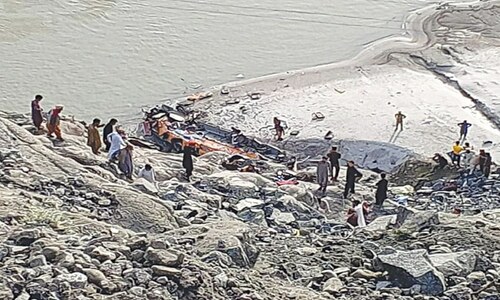ISLAMABAD, July 23: The sudden propping up of the so-called El Nino effects in South Asia has delayed the monsoon rains in Pakistan and India, which can cause a drought-like situation in the entire region, and also worried experts who fear another round of floods if the phenomenon takes an obverse turn.
“Currently the winds are hot and carry humidity but there is no system in sight that could bring monsoon rains,” an official of the Met Office said. “What we have at the moment are small patches of clouds bringing light showers in Sialkot, Gujranwala, Kashmir, Malakand and Gilgit-Baltistan.”
The official said westerly cool winds were needed urgently to turn the hot and humid waves coming from Arabian Sea and the Bay of Bengal into rain.
Despite predictions by the Met Office that the country would receive active rainfalls in the current monsoon season, the rains have been far below normal during June and July.
An advisory released by the Met Office on Monday said the weather on Tuesday would be mainly hot and humid in most parts of the country. However, thundershowers are likely in isolated places in southeast Sindh, northeast Punjab and Kashmir during evening and night.
According to official estimates, rains have been 50 per cent less than normal this summer and similar conditions have prevailed in northern India where rains have been 40 per cent below normal.
El Nino is a weather pattern related to flow of hot air from the north-western parts of South America towards the Pacific Ocean which shifts the rainfall from the mainland tropical forests towards the east in the ocean.
“For the local monsoon rains, this El Nino pattern reduced rainfalls and our share of clouds move towards the east, bringing heavy rains in Southeast Asia and China,” the Met Office official said.
However, the department estimates that El Nino could fade off in coming days and the region would start receiving normal monsoon rains from the first or second week of August.
“The situation is serious because even if we have normal rainfall in August water storage at the reservoirs across the country will not reach its required level,” the official said, adding that the underground water charging might also be affected.
Sources in the Met Office said that there also were other fears which haunted experts -- a repetition of weather pattern experienced in 2010.
“In 2010, severe rains from the western system coupled with another system at the eastern side wreaked havoc in Pakistan and brought severe floods,” he said, adding: “This started after July 28 and prior to it the whole month was dry.”
The official said many weather patterns were interlinked and Russia faced a severe heatwave and wildfires before the developing of El Nino in South Asia this year. There have been torrential rains causing floods in southern Russia early this month.
But the official said it was too early to predict anything as the El Nino effect could either fizzle out or mature in coming days.
“It all depends on the El Nino behaviour during the next couple of weeks but that could be very serious for the country,” he added.














































Dear visitor, the comments section is undergoing an overhaul and will return soon.